Loujain al-Hathloul spent 73 days in prison after taking part in the campaign to allow women to drive.
While we are busy with our Diwali celebrations, history is being created in Saudi Arabia where over a 1000 women nominated themselves as the first ever women candidates to participate in an election. Saudi Arabia, as most of you know is an extremely conservative country, where women are not allowed to drive and they are certainly not allowed to travel without the permission of their guardians – father, husband or brother. These restrictions also meant women so far weren’t allowed to vote or take part in the elections – Saudi Arabia being the only country to fully restrict women all these years.
Now the restrictions on voting have been lifted and for the first time ever in their long and chequered history, women are participating in the elections with over a thousand nominations already. Of course, it’s a limited kind of freedom where they are not allowed to publish their photographs on the campaign leaflets nor are they allowed to directly address men in the process. But freedom it is, nevertheless.
Most of the women who are participating for the first time are activists, professionals and some housewives – people who see themselves as apolitical but wanting to improve their local community. “I’m not excited by the idea of winning,” said Loujain al-Hathloul, who earlier this year was released from 73 days in prison after taking part in the campaign to allow women to drive. Now she is Candidate Number 1 for Riyadh District 5. “I’m focussed on increasing the number of women who stand in elections,” she told the Telegraph.
The benefit, everybody claims, is due to the benevolent, progressive rule of King Abdullah, who died in January this year. Under his rule, the number of women at university overtook the number of men, while he also ordered that women be allowed to work as shop assistants, since when hundreds of thousands of women have joined the workforce.
The kingdom has also given 750,000 students scholarships to study abroad in the last decade or so, many of them women, and the change is often most noticed by them when they return.
“Since I returned I have worked, I travel, and no one has ever asked for my permission from a guardian,” said Haifa al-Halabi, an architect who studied and worked in London and Glasgow before returning to Saudi Arabia two years ago.
She is now standing as a candidate for Riyadh District 4, has a column in a local newspaper under hijab-less picture byline and is happy to meet a male journalist at home wearing a tee-shirt with the slogan “Punk’s Not Dead.”
Aziza al-Yousef, a veteran feminist, however, feels that the election is mere play. “Things are actually getting worse and worse,” Mrs Yousef said, referring to fears that the new king, Salman, with a reputation as a conservative, will halt his predecessor’s reforms.
“I think we need to change the whole system. We don’t need revolution but we need evolution, to change the structure of government.”
The number of women going to university had just created a “well-educated prison,” she said. But Mrs Assada said it was still worth participating as a way of showing both men and women what was possible.
“It’s just baby steps, and the people want more and more,” she said. “It’s not that they are giving us our rights. But it’s not too hard a way to educate women and people in general throughout society what our rights are.”
Image via Facebook
More on>> Balancing Act



